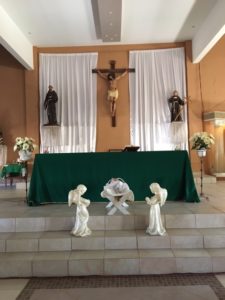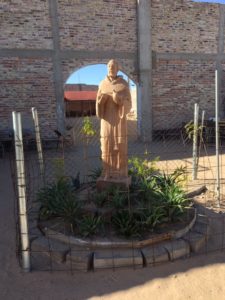As we anticipate the Third Sunday of Ordinary Time, we share a meaningful Franciscan Gospel reflection and questions written by Fr. Paul Gallagher, OFM. They are edited by Franciscan Sister of Christian Charity Sister Anne Marie Lom and Joe Thiel. The excerpts from the Sunday readings are prepared by Joe Thiel. To read or download the complete pdf with excerpts for your prayer, please click here: Franciscan Gospel Reflection January 27 2019. Excerpts are from the Lectionary for Mass for Use in the Dioceses of the United States of America, second typical edition © 2001, 1998, 1997, 1986, 1970 Confraternity of Christian Doctrine, Inc., Washington, DC. Used with permission. All rights reserved. No portion of this text may be reproduced by any means without permission in writing from the copyright owner. Please include this information when printing.
Photos: San Francisco de Asis and San Felipe de Jesus, Mexico
Luke 1:1-4, & 4:14-21
Since many have undertaken to compile a narrative of the events that have been fulfilled among us, just as those who were eyewitnesses from the beginning and ministers of the word have handed them down to us, I too have decided, after investigating everything accurately anew, to write it down in an orderly sequence for you, most excellent Theophilus, so that you may realize the certainty of the teachings you have received.
Jesus returned to Galilee in the power of the Spirit, and news of him spread throughout the whole region. He taught in their synagogues and was praised by all.
He came to Nazareth, where he had grown up, and went according to his custom into the synagogue on the Sabbath day. He stood up to read and was handed a scroll of the prophet Isaiah. He unrolled the scroll and found the passage where it was written: “The Spirit of the Lord is upon me, because he has anointed me to bring glad tidings to the poor. He has sent me to proclaim liberty to captives and recovery of sight to the blind, to let the oppressed go free, and to proclaim a year acceptable to the Lord.” Rolling up the scroll, he handed it back to the attendant and sat down, and the eyes of all in the synagogue looked intently at him. He said to them, “Today this scripture passage is fulfilled in your hearing.”
Background
In the first verses of Luke’s gospel he acknowledges that others’ gospels have been written; he goes on to explain what he intends to accomplish by writing this gospel. He is going to write an orderly narrative, a historical work, at least as he understands it in his day. He also says that he is going back to what has been handed down to us through the eyewitnesses and the ministers of the Word. He does not include himself in either of these two groups, indicating that he himself is not a witness to the events he is recording. His gospel has been written for an individual, Theophilus, and therefore it is not meant to be used as the Christian community gathers for prayer or to celebrate the Lord’s Supper. Its purpose is to reassure Theophilus that what has been taught about Jesus is accurate and reliable.
After this introduction, the text for this Sunday moves to the beginning of Jesus’ public ministry in his hometown synagogue of Nazareth. It skips over the material that the Church used during the Christmas season, and it skips another text that will be used later in the liturgical year. This gospel text ends with Jesus’ bold proclamation that today in Nazareth, in this synagogue, this passage from Isaiah is being fulfilled.
The passage that Jesus reads from the prophet Isaiah focuses on God’s proclamation of blessing to the poor, the captives, the blind, and the oppressed. Luke’s gospel will portray a Jesus who was present to those in his society who were forgotten and overlooked by the religious leaders of his day. Throughout Luke’s gospel there is a sense that Jesus is acting under the power of the Spirit of God. That is evident and stated specifically in this text as well.
Reflection Questions
1. When you think of Luke being a person never having known Jesus, trying to compile an orderly account of the life of Jesus…
2. If Luke would not have put forth the effort to write his gospel…
3. Imagine that you are among those gathered that day in Jesus’ hometown synagogue. What is going through your mind as the men gather and motion to Jesus to stand and read?
4. Jesus deliberately found and read a portion of the book of the prophet Isaiah that says: “The Spirit of the Lord is upon me, because he has anointed me to bring glad tidings to the poor…” What goes through you as you hear Jesus read this passage from Isaiah?
5. How is this passage from Isaiah being fulfilled in your own hearing?
6. In what ways does it still need to be fulfilled?
7. Can you talk with God now about what Jesus did that day in his hometown synagogue, or about the significance of what he did for you, or about anything else that arose within you as you read this gospel?




